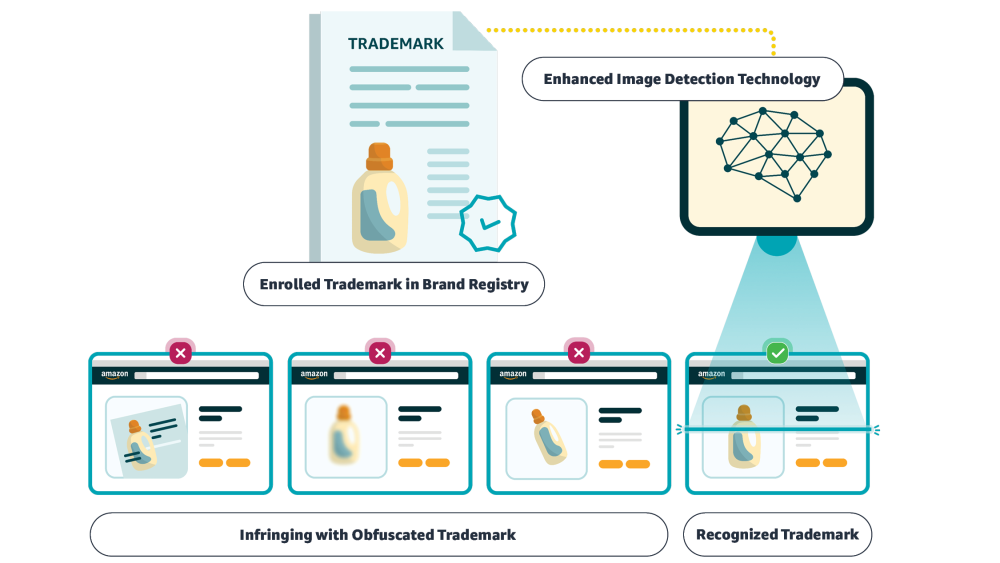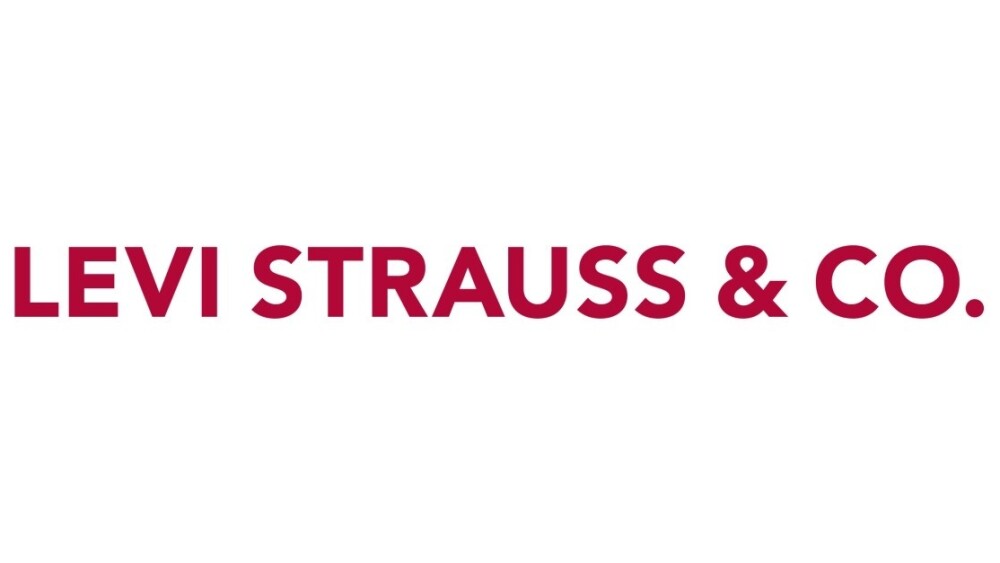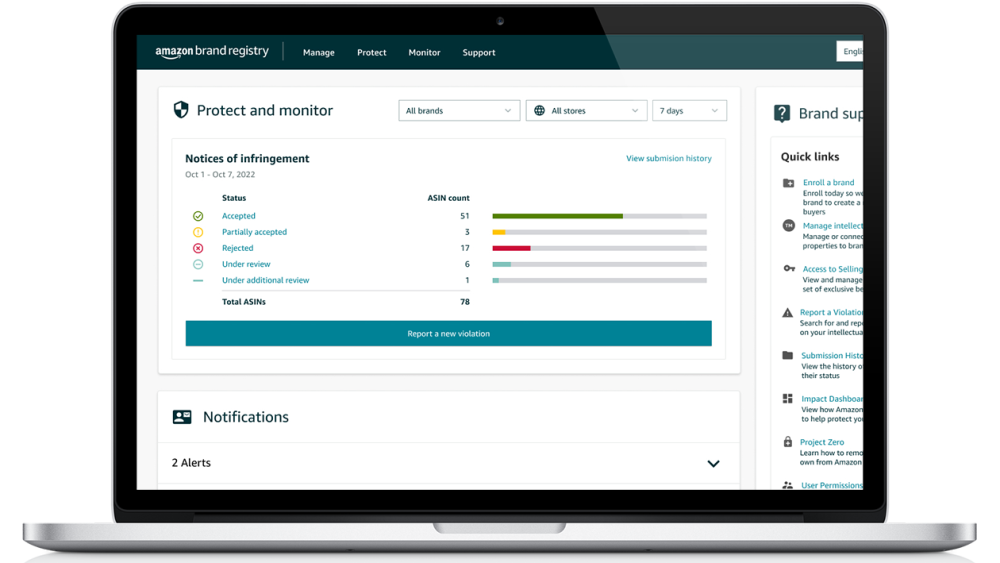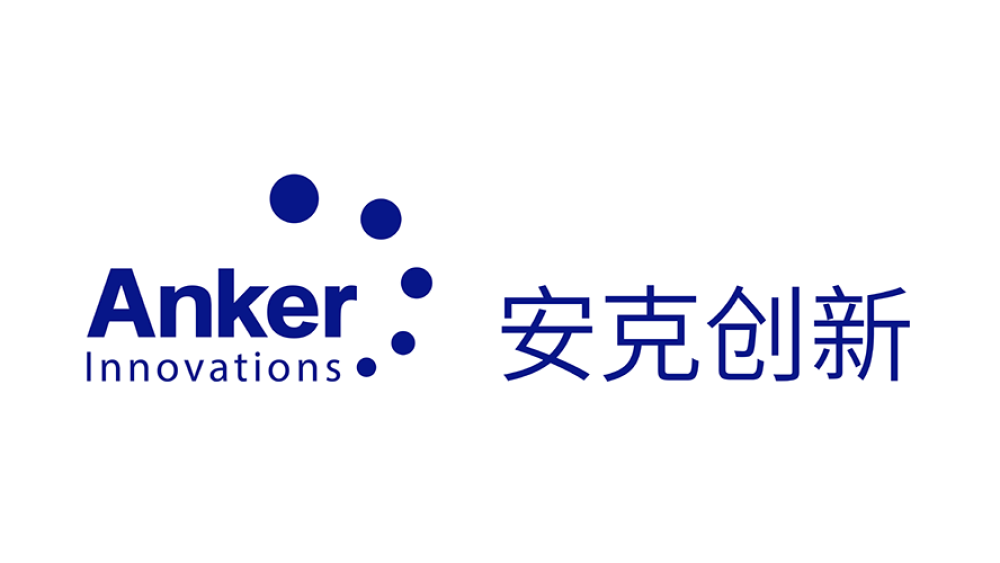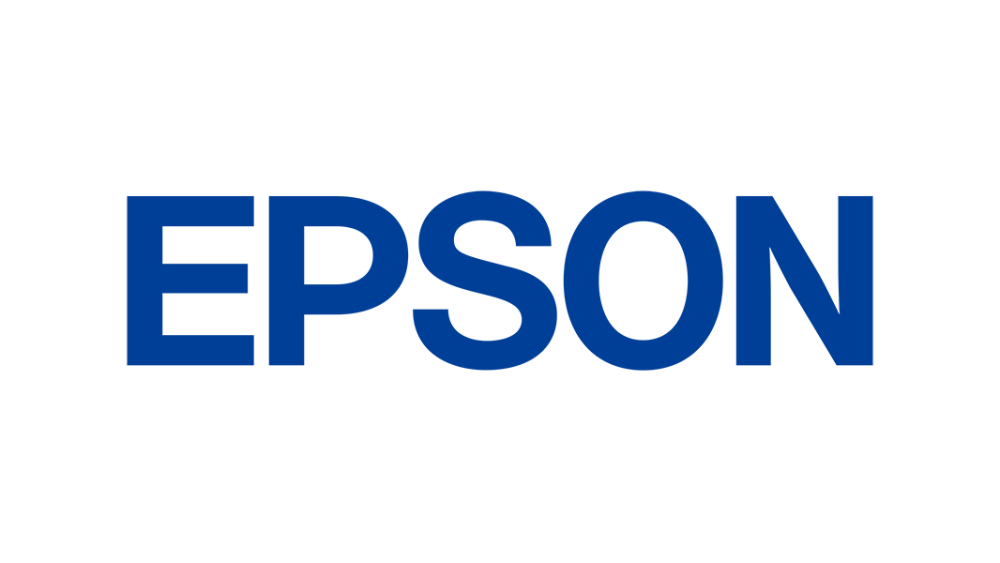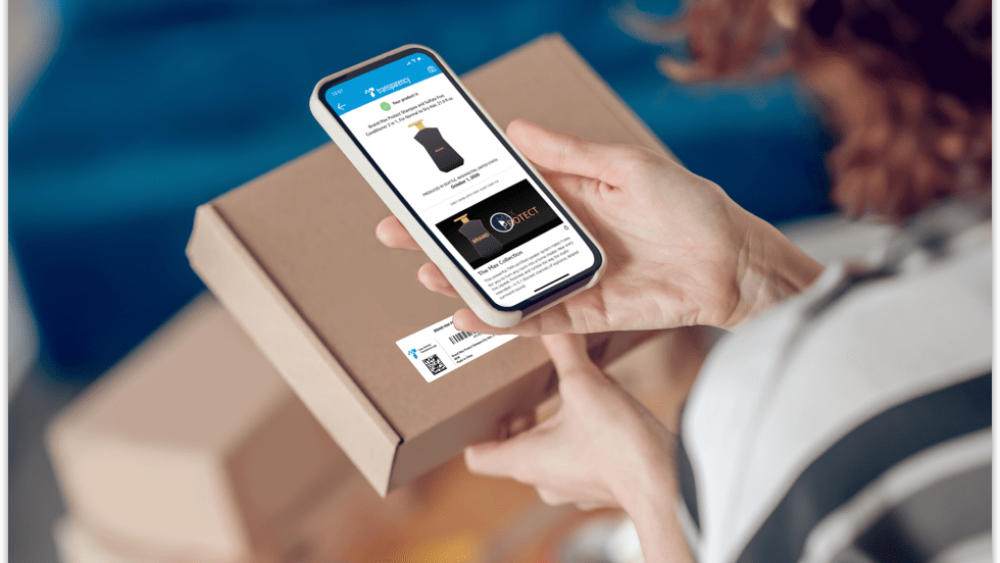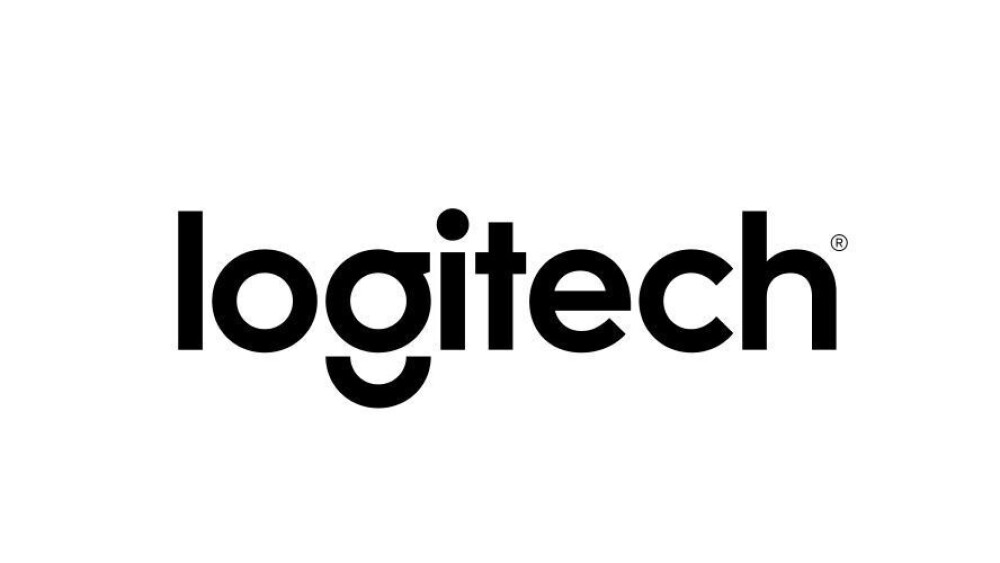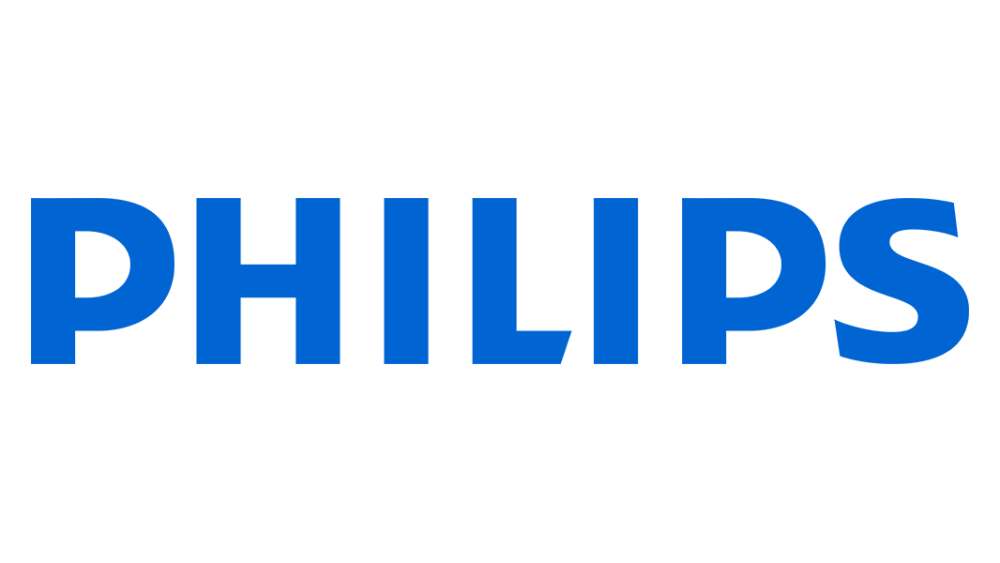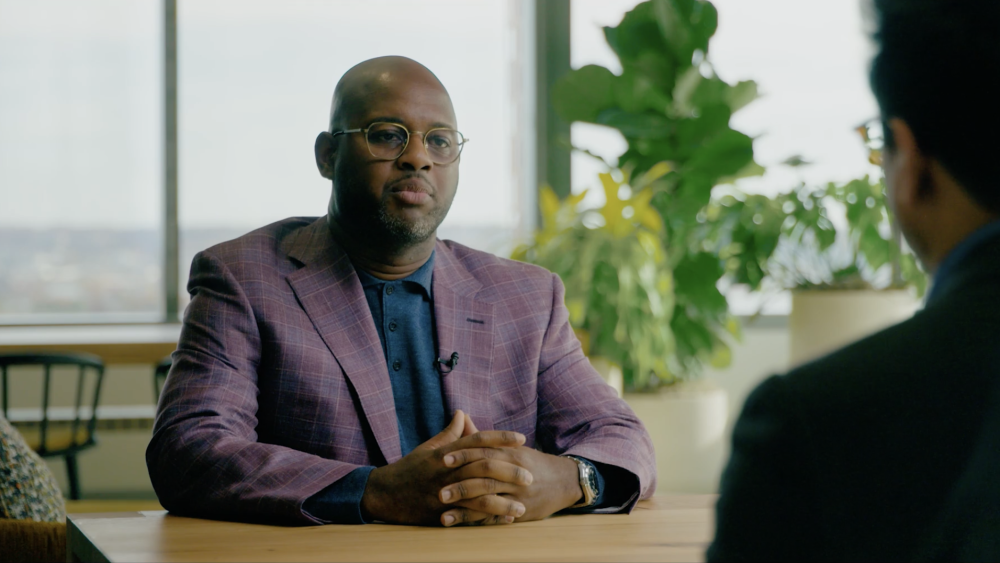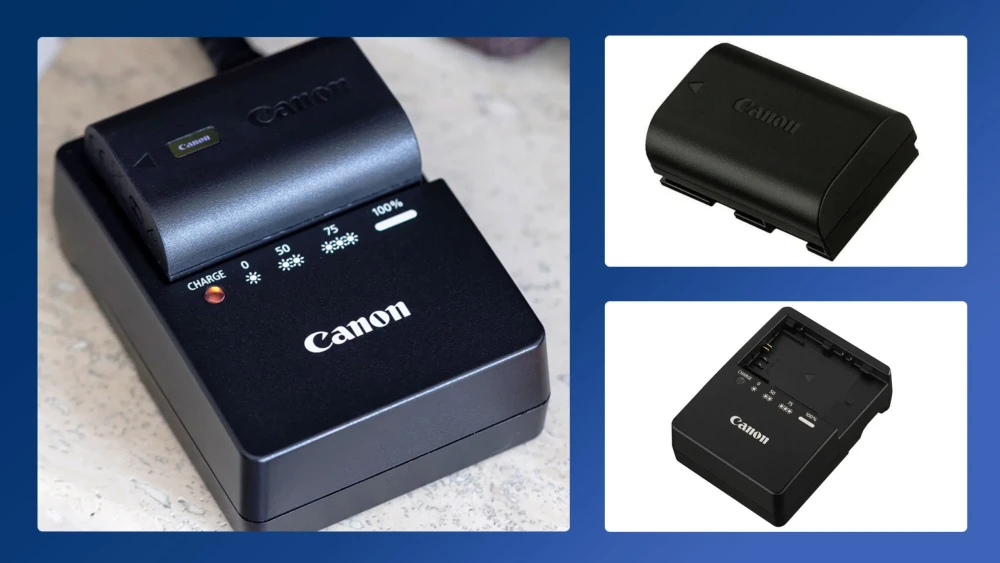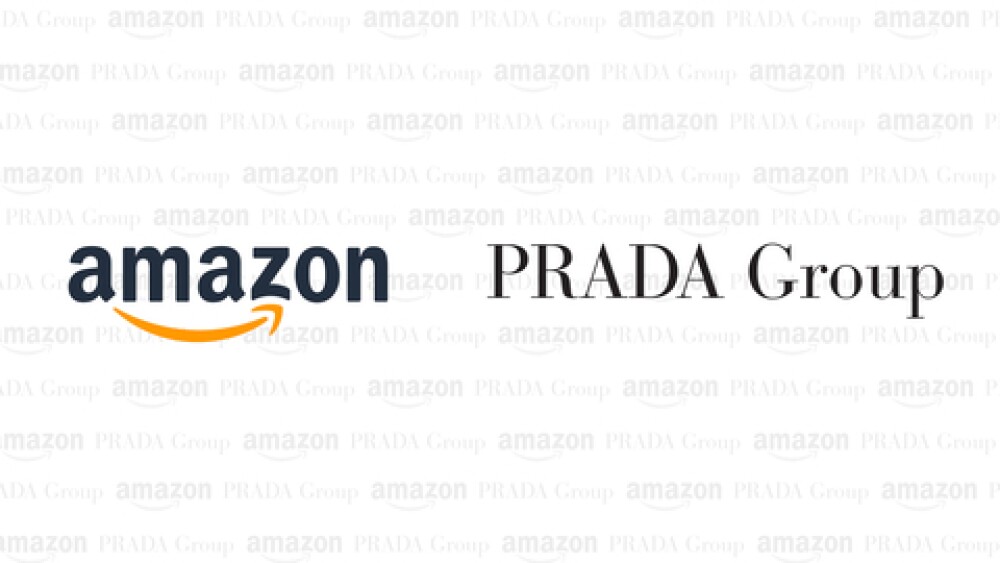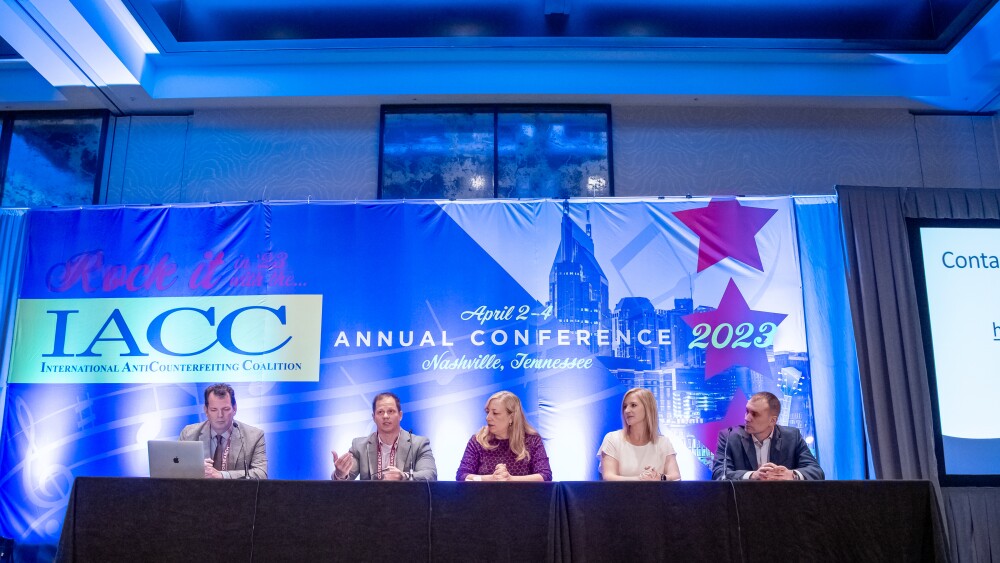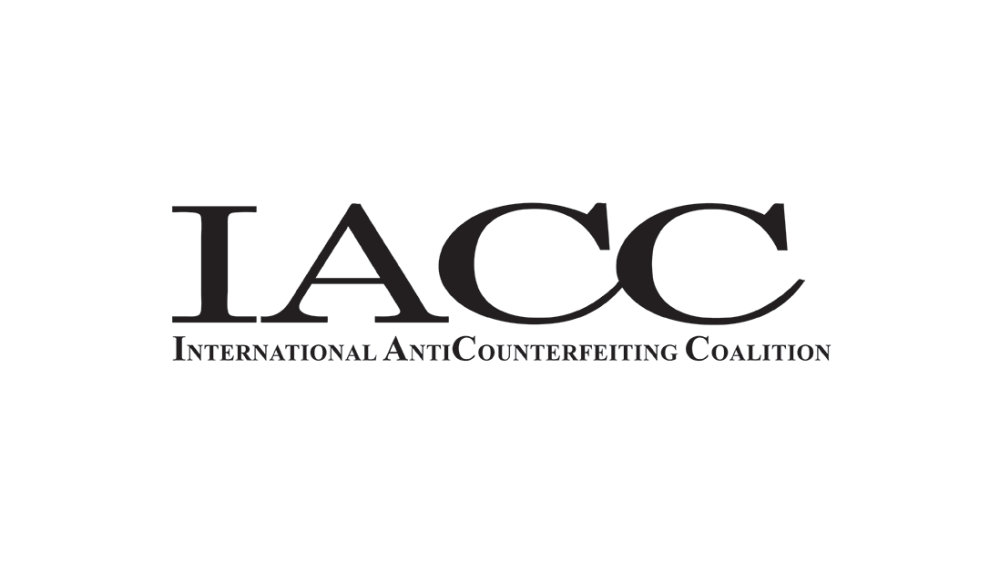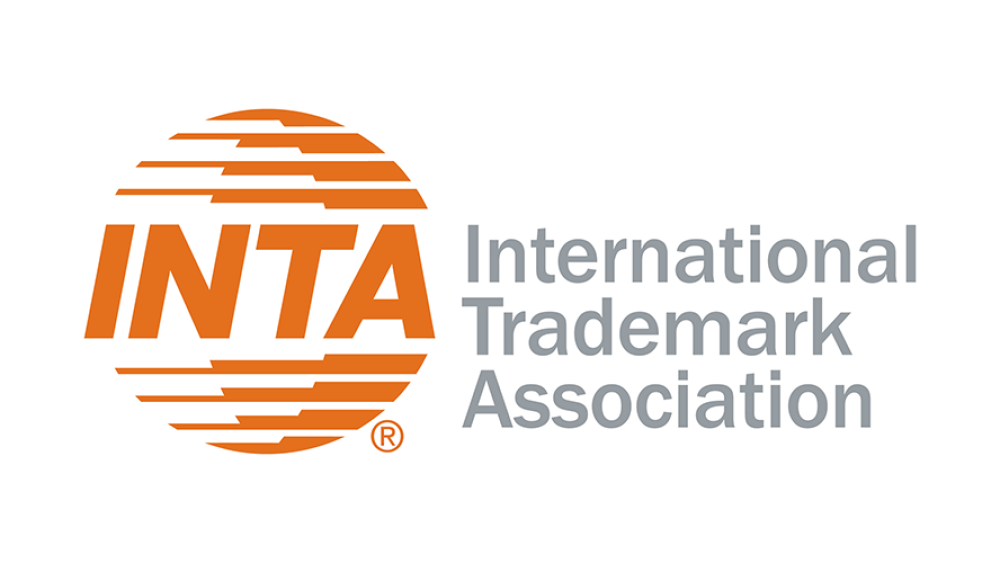Brand Protection Report
Published March 2024
Nearly three decades ago, Amazon set out to be Earth’s most customer-centric company, where people can discover and purchase the widest possible selection of safe and authentic goods. When a customer makes a purchase in our store, they trust that they will receive an authentic product, whether the item is sold by Amazon Retail or by one of millions of independent sellers. And when businesses choose to sell in our store, they trust that we will provide a great selling experience, free from competition with bad actors. We understand that customer trust is difficult to earn and easy to lose, which is why trust is at the foundation of the relationships we build and the innovations we make on behalf of our customers and selling partners.
In 2023, Amazon invested more than $1.2 billion and employed more than 15,000 people – including machine learning scientists, software developers and expert investigators – who were dedicated to protecting customers, brands, selling partners and our store from counterfeit, fraud and other forms of abuse.
The success of our brand protection strategy continues to focus on four key areas: (1) powerful and highly effective proactive efforts to protect our store; (2) industry-leading tools enabling rights owners to partner with us to better protect their brands; (3) advances in holding bad actors accountable; and (4) improved customer protection and education. This has been a journey over many years, and we have continued to find great success in stopping counterfeits.
Here are a few highlights from our 2023 Brand Protection Report that stand out as examples of progress in these four key areas:
Our innovations in seller vetting are deterring bad actors from attempting to create new selling accounts. Our robust seller verification uses document forgery detection, advanced image and video verification, and other technologies to quickly confirm the authenticity of government-issued identity documents and whether they match the individual applying to sell in our store. These technologies, coupled with continued innovation in our machine learning-based detection, are deterring bad actors from attempting to create new Amazon selling accounts. In 2023, Amazon stopped more than 700,000 bad actor attempts to create new selling accounts, stopping them before they were able to list a single product for sale in our store. This is down from 6 million attempts by bad actors to create new Amazon selling accounts in 2020.
While the number of products available for sale in our store continued to grow, the number of valid notices of infringement submitted by brands decreased. We continue to innovate and improve our automated brand protections, which leverage advanced machine learning models that use thousands of signals, including data provided by brands enrolled in Brand Registry. In 2023, our team used a variety of advanced machine-learning models, including large language models, to systematically detect many different types of infringement, including complex visual intellectual property. Since 2020, while the number of products available for sale in our store has grown significantly, we have seen a more than 30% decrease in total valid notices of infringement submitted by brands.
Working in partnership with brands and law enforcement around the world, we continue to successfully hold more bad actors accountable – stopping them from abusing our and other retailers’ stores. Our efforts to identify and dismantle counterfeit organisations are working and having a positive, global impact. Since its launch in 2020, Amazon’s Counterfeit Crimes Unit has pursued more than 21,000 bad actors via litigation and criminal referrals to law enforcement. In 2023, we identified, seized and appropriately disposed of more than 7 million counterfeit products worldwide, preventing them from harming customers or being resold elsewhere in the retail supply chain. In addition to the disposal of counterfeit products, in 2023, Amazon strengthened its cross-border anti-counterfeiting collaboration with brands and Chinese law enforcement, which led to more than 50 successful raid actions with more than 100 bad actors identified and detained for questioning, many of whom are manufacturers, suppliers or upstream distributors of counterfeit products. This collaboration resulted in numerous criminal convictions, including fines and prison sentences.
- We are working with industry experts and associations to educate consumers on the danger of purchasing counterfeits. We recognise the importance of educating consumers about the risks of counterfeit goods, and we continue to pursue a number of avenues to drive better consumer education. As one example, in partnership with the International Trademark Association and DECA, Amazon launched the Unreal Campaign Challenge. The challenge asked students to produce a 60-second video that was a public service announcement about the dangers of purchasing counterfeits. The Unreal Campaign Challenge reached more than 177,000 global DECA members, and the winners were recognised at DECA’s annual International Career Development Conference in front of 22,000 students.
We are proud of the progress we have made in preventing counterfeits within our store. This has required significant innovation, and it would not be possible without the partnerships we have been able to build with brands, associations, policymakers, law enforcement and others. While we believe that we have made a great deal of progress, we remain committed to continued innovation and will not rest until we drive counterfeits to zero.
I invite you to read our 2023 Brand Protection Report, where you will find more detailed updates on these strategic areas of focus and the progress that we have made in 2023.
Thank you,
Robust Proactive Controls

In 2023, Amazon stopped more than 700,000 bad actor attempts to create new selling accounts, stopping them before they were able to list a single product for sale in our store. This is down from 6 million attempts by bad actors to create new Amazon selling accounts in 2020.
Selling in Amazon’s store opens a world of opportunity for entrepreneurs. We make it straightforward for businesses to set up a selling account, but very difficult for bad actors to do so. Through our continued investment in advanced machine learning, we have improved our proactive controls, automating and scaling our intellectual property protection and counterfeit detection systems. These systems operate continuously throughout every step of the process – from the moment someone tries to register a new selling account, create a new listing or update existing listing information. In most cases, bad actors are stopped from even creating an account or listing a single product for sale, and prohibited content is stopped before a customer ever sees it.
Amazon uses advanced technology and expert human reviewers to verify the identities of potential sellers. When prospective sellers apply to sell in Amazon’s store, they are required to provide a form of government-issued photo IDs, along with other information about their business. We employ advanced identity detection methods like document forgery detection, image and video verification, and other technologies to quickly confirm the authenticity of government-issued IDs and whether they match the individual applying to sell in our store. In addition to verifying these, Amazon’s systems analyse numerous data points, including behaviour signals and connections to previously detected bad actors, to detect and prevent risks.
Similarly, throughout the selling experience in our store, Amazon’s systems monitor selling accounts to identify anomalies or changes in account information, behaviours, and other risk signals. In the event Amazon identifies a risk of fraud or abuse, we promptly initiate an investigation using automated and/or human review, request additional information where helpful, and swiftly remove bad actors from our store.
From the moment a seller lists a product for sale in our store, our advanced technology continually scans for potential infringement. Amazon’s automated technology scans billions of attempted changes to product detail pages daily for signs of potential abuse, including the creation of new listings and changes to existing listings. For example, our tools use advanced machine learning to prevent the attempted listing of counterfeit or infringing products – scanning keywords, text and logos which are identical or similar to registered trademarks or copyrighted work. We use the data and learnings gathered throughout these processes to innovate and improve our proactive protections. When we receive a valid notice of infringement or a customer complaint, our machine learning algorithms use this information to learn and improve protections for brands.
Spotlight
How Amazon uses artificial intelligence (AI) to protect brands’ intellectual property
Our teams leverage the latest advances in computer vision, risk and large language models to build automated solutions that proactively identify and remove infringing listings from our store.
In 2023, through the use of cutting-edge technologies such as computer vision and large language models, our teams have dramatically improved our ability to accurately detect complex visual IP infringements such as logos, shapes and patterns. This includes infringements where logos are purposefully manipulated in an attempt to evade our detection systems. Due to the broad knowledge of large language models, they excel in handling complex repetitive tasks efficiently and with precision at scale. These advances allow Amazon to stay ahead of new and emerging bad actor tactics while scaling our protections, which systematically perform automated evaluations on tens of millions of product images each week.
Powerful Tools to Protect Brands

Since 2020, while the number of products available for sale in our store has continued to grow, we have seen a more than 30% decrease in the total valid notices of infringement submitted by brands.
When 7-year-old Alex had a vision to create a card game called Taco vs Burrito, his mum, Leslie Pierson, helped make it a reality. Leslie knew about Amazon Brand Registry, a free programme that helps brands protect their intellectual property and listings from her prior experiences of selling on Amazon. They started the trademark registration process to protect their brand before they launched. As a result, they were able to join Brand Registry right away, unlocking additional protection tools such as Report a Violation, Transparency and Project Zero to help them keep their intellectual property safe from bad actors. Watch the video here to learn more about their journey.

Watch the video here.
In 2017, we launched Amazon Brand Registry, a free service for brand owners regardless of whether they sell in our store. The service provides brands with the ability to better manage and grow their brand with Amazon while protecting their intellectual property rights. Via the Report a Violation tool, brand owners can search for, identify and report infringements, and subsequently track their submissions within the dedicated Submission History dashboard.
Brand Registry allows Amazon to more effectively safeguard brands via automated protections that leverage machine learning and the data provided in Brand Registry. Our automated protections use the data that brands provide to continuously scan Amazon’s store and stop potentially infringing products from being listed. Within Brand Registry, the Impact Dashboard provides brands with a snapshot of Amazon’s proactive protections, including data on volume of infringing listings blocked or removed for each brand by country and product category.
In addition to brand protection tools, enrolling in Brand Registry unlocks a suite of brand-building tools only available to brand owners, including Brand Stores, Sponsored Brands, Brand Analytics and many more powerful features.
Sr. Director, Global Brand Protection, Levi Strauss & Co.
Brand Registry gets a new, customized homepage
Based on feedback received from brands, Amazon redesigned the Brand Registry homepage, making our most used features – such as Report a Violation and Impact Dashboard – easier to access, while giving brands the ability to customise their homepage layout based on their needs. Brands can now find information regarding notice accuracy, enrolment status and relevant help pages right on the homepage.
Stopping Fraudulent Trademarks in Collaboration with the USPTO
Amazon relies on the accuracy of the trademark information provided by brands in order to ensure that fraudulent trademark applications and registrations are not used to enrol in Brand Registry. Amazon works with the United States Patent and Trademark Office (USPTO) to prevent fraud and abuse in the trademark system. Amazon directly receives and acts upon information from the USPTO regarding registration status and parties that have been subject to USPTO sanctions, including attorneys that have been blocked by the USPTO. We leverage this information to remove false, and otherwise abusive, brands and share trends within our store with the USPTO to support their investigation of potential fraud by anyone attempting to disrupt the US Trademark Registration system. This information sharing also ensures that fraudulent trademark applications and registrations are not used to enrol in Brand Registry.
In 2023, Amazon strengthened its collaboration with the USPTO and began leveraging a combination of data and signals to identify sanctioned trademarks, helping our teams scale our efforts to detect and enforce bad actors in Brand Registry.
Amazon Patent Evaluation Express (APEX)
In addition to providing trademark infringement and anti-counterfeiting protections, we launched APEX in 2018 to give utility patent owners a forum to effectively resolve patent infringement disputes at a much faster speed than the traditional court system. APEX allows brands to request evaluations for disputes of utility patents and track the decision process via the Report a Violation tool. Because of the technical complexity of many utility patents, a patent infringement lawsuit often lasts several years, costing hundreds of thousands of dollars or more. The APEX process invites a neutral third-party expert evaluator to determine whether a product is infringing, reducing the time it takes to obtain a decision to an average of 30 days. This is much faster than the two years it takes for the average US patent lawsuit to get to trial. The APEX process also ensures that the winning party does not pay any of the legal costs.
Amazon’s IP Accelerator helps small businesses efficiently obtain intellectual property rights, offering a trusted and cost-effective way for business owners to protect their brands. IP Accelerator expedites a brand’s access to Brand Registry, jump-starting Amazon’s protection tools and brand-building benefits.
Project Zero combines Amazon’s advanced technology with the sophisticated knowledge that brands have of their own intellectual property and how best to detect counterfeits of their brands. This happens via our powerful brand protection tools, including automated protections, product serialisation capabilities and the unprecedented ability we give brands in Project Zero to directly remove counterfeit listings from our store.
IP & Brand Protection Manager – North America, Epson
Transparency is a product serialisation service that prevents counterfeits from reaching customers by using codes to uniquely identify individual units of enrolled products. These codes can be scanned throughout the supply chain and by customers to verify authenticity using the Amazon Shopping app or Transparency app, regardless of where the products were purchased. Amazon verifies these codes to ensure that only authentic units are shipped to customers. When a customer shops in our store, a Transparency badge highlights that each item has a unique code applied by the brand that we verify before shipping. This badge is part of Amazon’s mission to
proactively prevent counterfeits and allow customers to verify that a product comes from the brand.
Spotlight
Transparency is interoperable with brands’ own product serialisation systems
Interoperability allows brands that already have their own product serialisation on their products or packaging to easily, and more quickly, benefit from Transparency’s counterfeit protections without requiring any changes to their existing manufacturing and packaging processes.
Global Vice President, Head of Global Supply Chain, Logitech
Holding Bad Actors Accountable

In 2023, Amazon identified, seized and appropriately disposed of more than 7 million counterfeit products worldwide, preventing them from harming customers or being resold elsewhere in the retail supply chain.
In partnership with brands and law enforcement, we have been able to hold more bad actors accountable via civil litigation and criminal referrals to law enforcement organisations – working to stop them from abusing our and other retailers’ stores across the industry in the future. While we believe that we have made a great deal of progress, we remain committed to continued innovation and will not rest until we drive counterfeits to zero.
Our Counterfeit Crimes Unit (CCU) is a global team that includes former federal prosecutors, FBI agents, expert investigators and data analysts. CCU, customs agencies and law enforcement share information to track down counterfeiters, shut down bad actors’ accounts, seize counterfeit inventory and prosecute those involved. CCU has disrupted counterfeiters and their networks via civil suits, joint enforcement actions and seizures with law enforcement worldwide, including against suppliers, logistics providers, social media influencers, fake invoice providers and more.
The fight against counterfeits is a global one, with bad actors operating across many retail channels and constantly trying new tactics in an attempt to evade our detection. When we find a counterfeit, we go beyond our store, working upstream to identify the warehouses and distribution network involved in the counterfeit production so we can prevent these products from re-entering the supply chain. This protects and benefits customers whether they are shopping on Amazon or elsewhere. As part of these efforts, Amazon strengthened its cross-border anti-counterfeiting collaboration with brands and Chinese law enforcement in 2023, which led to more than 50 successful raid actions with more than 100 bad actors identified and detained for questioning, many of whom are manufacturers, suppliers or upstream distributors of counterfeit products. This collaboration resulted in numerous criminal convictions, including fines and prison sentences.
Head of Trademark and Design, Philips
Head of Intellectual Property Law, Trademarks, Designs, BMW Group
Spotlight
Counterfeit Crimes Unit in the news
Interoperability allows brands that already have their own product serialization on their products or packaging to easily, and more quickly, benefit from Transparency’s counterfeit protections without requiring any changes to their existing manufacturing and packaging processes.
Blueprint for Public and Private Sector Partnership to Stop Counterfeiters
In 2021, we launched a blueprint for private and public sector partnership to stop counterfeiters. Since publishing the blueprint, the importance of private and public sector collaborations has grown alongside interest in these partnerships. We are excited to see these relationships expanding, and are encouraged that others in the industry are adopting the practices that we are championing.
In 2023, we saw a number of successes within each pillar of the blueprint:
Exchanging information about counterfeit activity to help stop counterfeits at the border: Amazon advocates for greater information sharing to stop counterfeits at the border. We continue to expand our work with customs agencies to mutually exchange information on counterfeit activity. We can aid customs agencies in their detection, search and seizure efforts, and strengthen law enforcement’s ability to dismantle criminal networks behind these illicit goods. Customs agencies can work with us to not only stop the shipments they seize, but to also help freeze other assets and inventory from counterfeiters that we may know about.
In 2023, Amazon became the first retailer to join the European Union Intellectual Property Office (EUIPO) Intellectual Property Enforcement Portal (IPEP). The IPEP includes customs officials, police authorities, rights holders and now retailers, who are dedicated to identifying, detecting and stopping counterfeits from reaching consumers within the EU. Amazon now has formal information-sharing partnerships with customs and law enforcement agencies in three major regions: the US, the EU and Japan. In 2023, Amazon partnered with U.S. and Japanese customs agencies in stopping more than 100,000 counterfeits from reaching domestic supply chains and harming customers.
Sharing information about blocked counterfeiters to help the industry stop more counterfeiters earlier: We believe that there should be more private sector information sharing. As we laid out in the 2021 blueprint, it’s critical that both private and public sector partnerships include greater sharing of information. Our membership in the Anti-Counterfeiting Exchange (ACX), which is an industry collaboration in the US, is designed to make it more difficult for counterfeiters to move among different stores, and safer for consumers to shop anywhere they choose. We are eager to see the same or similar efforts across the globe, which will help partners across the industry expand their individual and collective efforts to detect counterfeits and stop them from reaching consumers. We continue to support collaborative anti-counterfeiting best practices in the EU, such as those laid out in the EU Toolbox against counterfeiting and the framework of the EU Memorandum of Understanding.
Increasing resources for law enforcement to prosecute counterfeiters: Amazon acknowledges and respects the hard work of law enforcement and prosecutors in fighting counterfeiters around the world. We are proud of our collaborations with agencies to combat these criminals, and will continue to share information regarding confirmed counterfeiters blocked from selling in our store. We will continue to go further and provide authorities with high-quality criminal referrals and evidence to enhance their ability to hold counterfeiters accountable and dismantle the criminal networks behind these illicit goods.
In 2023, Amazon signed a Memorandum of Understanding (MOU) with the Italian Ministry of Internal Affairs that aims to bolster the fight against counterfeiters in Italy. Via the MOU, Amazon shares information about identified counterfeiters’ modus operandi with the Ministry, supporting their internal efforts to develop policies and resources that support law enforcement action. With this partnership, Amazon and the Ministry have highlighted the importance of collaboration and prioritising anti-counterfeiting resources for law enforcement. Amazon’s efforts in leading public and private sector collaborations and developing new proactive anti-counterfeiting strategies were highlighted by the Ministry in their five-year report, “Counterfeiting: The evolution of this criminal phenomena in the online and offline market (2018–2022).” Read More →
While we are proud of the partnerships and collaborations that we have developed across the public and private sectors over the past year, we know that there is more that can be done to raise the bar on anti-counterfeiting efforts.
Amazon continues to work with leading industry associations and non-profit organisations to get feedback that helps us continue to improve our programmes, and share our best practices to help others be more successful, identify trends, pilot new capabilities and, ultimately, better protect customers and brands.
President, International AntiCounterfeiting Coalition
Executive Director, Asia Toy & Play Association
President, INDICAM
Protecting and Educating Customers

In partnership with the International Trademark Association, Amazon launched the Unreal Campaign Challenge, reaching 177,000 global DECA members, asking them to produce a 60-second public service announcement (PSA) video that highlights the dangers of purchasing counterfeits. The winners were recognised at DECA’s annual International Career Development Conference (ICDC) in front of 22,000 students.
Partnering with Industry
We recognise the importance of educating consumers about the risks of counterfeit goods, and we continue to pursue a number of avenues to drive better consumer education.
In Spain, we recorded a podcast with the Spanish Patent and Trademark Office to raise consumer awareness; in Poland, we worked with the Consumer Forum on the ‘live originally’ campaign; in India, we partnered with a leading industry association and held capacity-building workshops across the country; and in the UK, we partnered with Crimestoppers on a year-long social media campaign warning the public about the dangers of fake goods.
On World IP Day 2023, we initiated a campaign in partnership with the USPTO and leading China-based industry associations. Through a series of live-streams, videos and in-person events, we provided our selling partners in Shenzhen, Guangzhou and Ningbo with educational materials on the importance of protecting their IP.
In partnership with the International Trademark Association, Amazon launched the Unreal Campaign Challenge, reaching 177,000 global DECA members, asking them to produce a 60-second public service announcement (PSA) video that highlights the dangers of purchasing counterfeits. The winners were recognised at DECA’s annual International Career Development Conference (ICDC) in front of 22,000 students.
Chair of the Unreal Campaign Committee, INTA
Customer Guarantee
For decades, our A-to-z Guarantee has ensured that customers are covered and eligible for a full refund for any item they purchase if the customer isn’t happy with the condition or timely delivery of that product. This protects customers whether they bought the item from Amazon or an independent selling partner. Over the last few years, we went even further. Even if a customer doesn’t contact us, if we identify that a customer purchased a counterfeit product, Amazon proactively contacts the customer, informs them that they purchased a counterfeit product, and fully refunds their purchase. No customer action is necessary.



